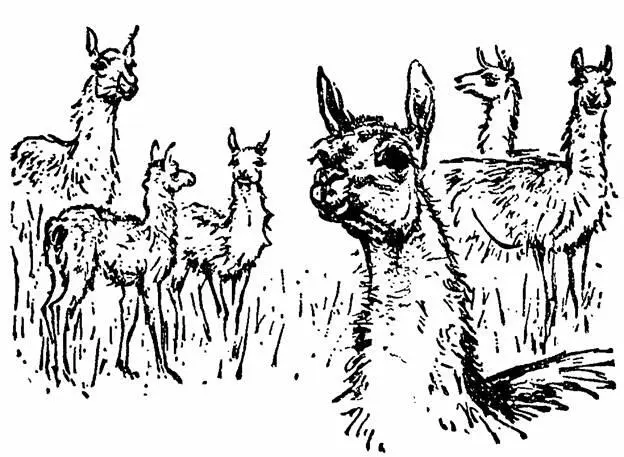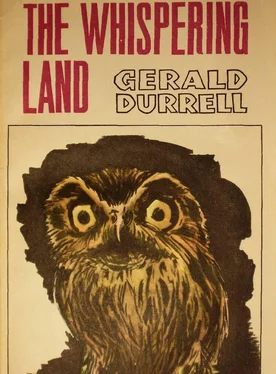Not only had the landscape changed in colouring and mood but had suddenly become alive. We were driving down the red earth road, liberally sprinkled with back-breaking potholes, [147] back-breaking potholes – holes in a road fit to break one's back when driving over them
when suddenly I caught a flash of movement in the undergrowth at the side of the road. Tearing my eyes away from the potholes I glanced to the right, and immediately trod on the brakes so fiercely that there were frenzied protests from all the female members of the party. But I simply pointed, and they became silent.
To one side of the road, standing knee-deep in the yellow bushes, stood a herd of six guanacos, watching us with an air of intelligent interest. Now guanacos are wild relatives of the llama, and I had been expecting to see something that was the same rather stocky shape as the llama, with a dirty brown coat. At least, I remembered that the one I had seen in a Zoo many years before looked like that. But either my memory had played me false [148] had played me false – had failed me, had deceived me
or else it had been a singularly depressed specimen I had seen. It had certainly left me totally unprepared for the magnificent sight these wild guanacos made.
What I took to be the male of the herd [149] what I took to be the male of the herd – the animal I took for the male guanaco (a guanaco herd consists of a male, several females and some baby guanacos)
was standing a little in front of the others and about thirty feet away from us. He had long, slender racehorse legs, a streamlined body, and a long slender graceful neck reminiscent of a giraffe's. His face was much longer and more slender than a lama's, but wearing the same supercilious expression. His eyes were dark and enormous. His small neat ears twitched to and fro as he put up his chin and examined us as if through a pair of imaginary lorgnettes. [150] a pair of… lorgnettes (Fr.) - a pair of eye-glasses usually held by a long handle; when using them, a person generally has to tilt back his or her head
Behind him, in a tight and timid bunch, stood his three wives and two babies, each about the size of a terrier, [151] terrier – a breed of dog, usually of small size
and they had such a look of wide-eyed innocence that it evoked strange anthropomorphic [152] anthropomorphic – here partly human, partly animal; the word is generally used when describing human-like traits or actions of animals, not vice versa, as in this case
gurgles and gasps from the feminine members of the expedition. Instead of the dingy brown I had expected these animals almost glowed. The neck and legs were a bright yellowish colour, the colour of sunshine on sand, while their bodies were covered with a thick fleece of the richest biscuit brown. [153] biscuit brown – see note to p. 32
Thinking that we might not get such a chance again I determined to get out of the Land-Rover and film them. Grabbing the camera I opened the door very slowly and gently. The male guanaco put both ears forward and examined my maneuver with manifest suspicion. Slowly I closed the door of the Land-Rover and then started to lift the camera. But this was enough. They did not mind my getting out of the vehicle, but when I started to lift a black object – looking suspiciously like a gun – to my shoulder this was more than they could stand. The male uttered a snort, wheeled about, and galloped off, herding his females and babies in front of him. The babies were inclined to think this was rather a lark, [154] rather a lark (colloq.) - very funny
and started gambolling in circles, until their father called them to order with a few well-directed kicks.

When they got some little distance away they slowed down from their first wild gallop into a sedate, stiff-legged canter. They looked, with their russet and yellow coats, like some strange ginger-bread animals, mounted on rockers, [155] rocker – a curved piece of wood on which a rocking-horse (children's toy) is mounted
tipping and tilting their way through the golden scrub.
As we drove on across the peninsula we saw many more groups of guanacos, generally in bunches of three or four, but once we saw a group of them standing on a hill, outlined against a blue sky, and I counted eight individuals in the herd. I noticed that the herds were commoner towards the centre of the peninsula, and became considerably less common as you drove towards the coast. But wherever you saw them they were cautious and nervous beasts, ready to canter off at the faintest hint of anything unusual, for they are persecuted by the local sheep-farmers, and have learnt from bitter experience that discretion is the better part of valour. [156] discretion is the better part of valour – a saying which means that it is unwise to take unnecessary risks
By the late afternoon we were nearing Punta del Norte on the east coast of the peninsula, and the road had faded away into a pair of faint wheel-tracks that wended their way through the scrub in a looping and vague manner that made me doubt whether they actually led anywhere. But, just when I was beginning to think that we had taken the wrong track, I saw up ahead a small white estancia, its shutters tightly fastened, and to the left of it a large Dutch barn or galpon. Knowing that a galpon was generally the centre of any activity on an estancia, I drove up to it and stopped. Three large, fat dogs immediately appeared, barked at us vigorously, and then, obviously thinking that their duty was done, set about the fascinating task of irrigating the Land-Rover wheels. Three peons came out from inside the barn, brown, lean, rather wild-looking men with wide, eager smiles. They were obviously delighted to see us, for strangers there were a rarity. They insisted that we go into the barn, brought chairs for us to sit on, and within half an hour they had killed a sheep and an asado was being prepared, while we sat and drank wine and told them why we had come.
They were fascinated by the thought that I should have come all the way from England just to catch and film bichos, [157] bichos (Sp.) - animal
and doubtless thought I was more than a little mad, though they were far too well-mannered to say so. On the subject of elephant seals and fur seals they were very informative and helpful. The elephant seals, they explained, had now had their babies and reared them. This meant that they were no longer to be found in one spot on the beach near the fur seals, which acted, as it were, as their maternity ward. [158] aternity ward – a ward in a hospital where women are taken Care of during and after childbirth
Now they drifted up and down the coast as the mood took them, and were difficult to find, though there were two or three places which they were particularly fond of where they might be located. These favourite haunts were called charmingly enough, the elefanterias. [159] elefanteria (Sp.) - a place favoured by elephant seals
The peons marked on the map the areas in which the elefanterias were to be found, and then they showed me where the biggest concentration of fur seals lived. These, they said, would be easy, for they still had young, and were therefore packed on the beach and easily accessible. Moreover, the peons went on, there was a good camping area just near the fur seal colony, a flat grassy space, sheltered from the wind on all sides by a gentle rise in the ground. Cheered by this news we drank more wine, ate large quantities of roast sheep, and then clambered into the Land-Rover again and set off to look for the camp site.
Читать дальше











